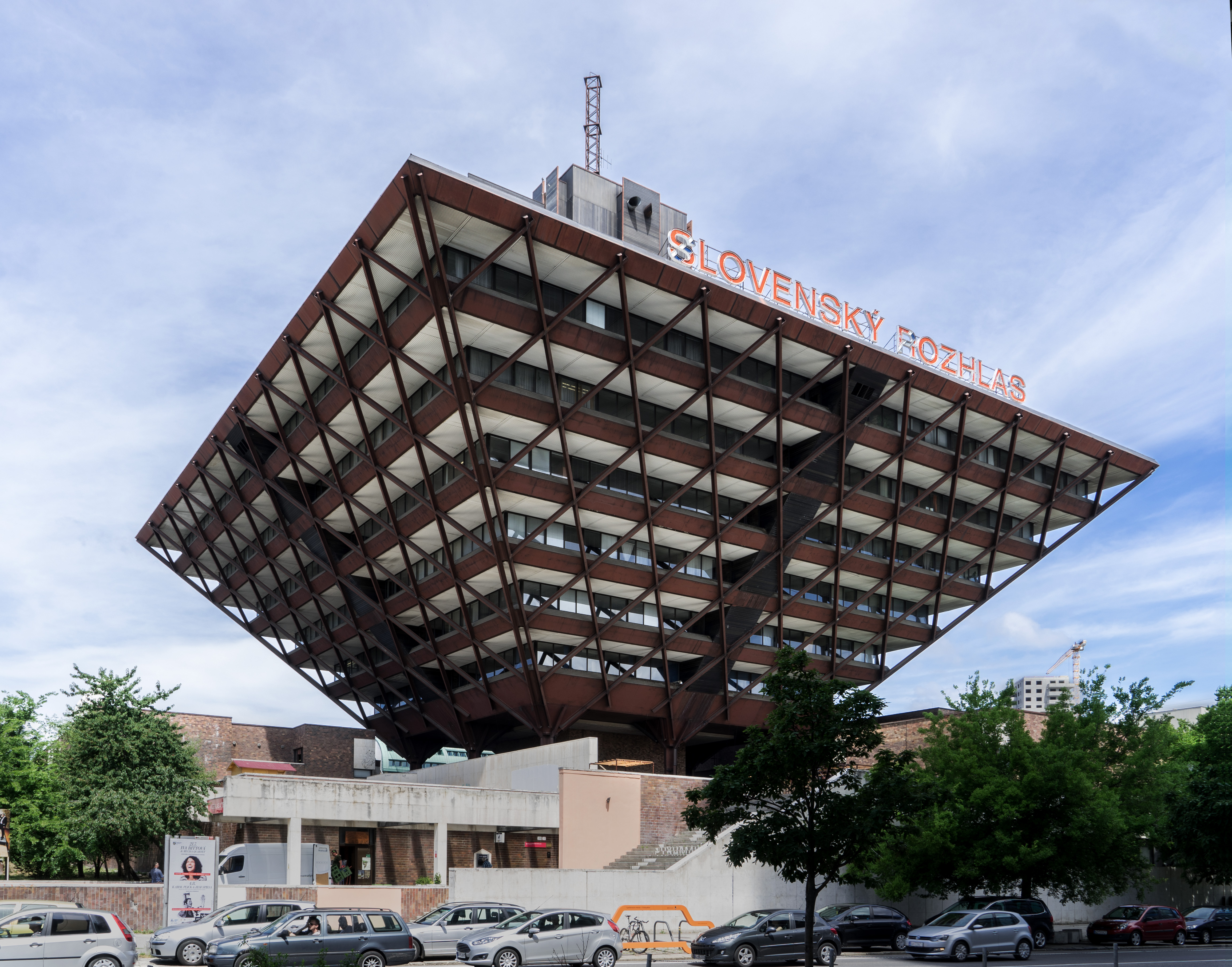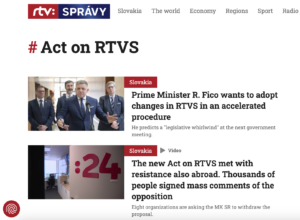Slovak government urged to abandon new public media law
21st March 2024
The Slovak government’s new proposal for the RTVS Act has caused serious concern amongst the public and media freedom groups over the future of RTVS’ editorial independence.

IN BRIEF:
- Robert Fico’s government announced a new law on public media that would give greater political control over public broadcaster RTVS.
- The Slovak government plans on renaming RTVS, dismiss the current board of the public media, and create a brand new board appointed by Parliament and the Ministry of Culture.
- The new bill has sparked criticism in Slovakia and across the EU, with thousands protesting in Bratislava. Media freedom groups have urged the Slovak government to abandon the new law.
- The Public Media Alliance supports calls from our civil society colleagues for the full withdrawal of the repressive broadcast law.
IN FULL:
– By Charlotte Pion
Media freedom groups are urging Slovakia’s government to abandon its proposed RTVS Act, due to fears it is an attempt from the government to acquire editorial control over the organisation.
“There is no real reason for cancelling RTVS, except one, and that is the effort to take over it politically”, said Slovakia’s President Zuzana Čaputová.
A new “public media”
As PMA recently reported, the Slovak government has been working to gain greater control over the country’s public service media by tightening RTVS’s budgets and threatening to divide it in two separate entities.
At the beginning of March, the Minister of Culture presented a new bill that would enable the government to exert a tight grip over RTVS. Under this new law, RTVS would be renamed Slovak Television and Radio (STaR), and the government would have the power to dismiss all current members of its board, even though it has a parliamentary mandate until 2027.
The new Board of STaR – which according to the Ministry of Culture’s plans, should consist of seven members, four appointed by the Parliament, and three by the Ministry of Culture – would hold the ability to appoint its Director General.
Read more: Slovakia: RTVS and media freedom under scrutiny
Initially, it was proposed the new Board would also have the power to dismiss the Director General without having to provide any grounds. However, the ruling coalition has since said they will remove this element following criticism, reported the CPJ.
The Law would also threaten the Media Services Council as it would be replaced entirely by a new office, which would have greater competences: to supervise the objectivity of the media and to regulate digital platforms, according to RTVS.

The broadcaster has itself strongly criticised the proposed reforms, saying “It’s the politicisation of public media, not its nationalisation,”. In a statement responding to the accusations made by Minister of Culture Martina Šimkovičová, the organisation said it was watching with concern the efforts of the current government coalition to take over the public media with the aim of “seizing them, subordinating them to strong political power and gaining control over them”. RTVS kept reporting on the evolution of the new RTVS bill, to which they have dedicated a whole part of their news website called #Act on RTVS.
Listen toour podcast
Uncovering and exploring the biggest
issues facing public media
Fierce criticism in Slovakia and abroad
Journalists and media freedom groups have called for the urgent withdrawal of the proposed legislation. On 15 March, thousands of people marched through the streets of Bratislava and Košice to protest against the government of Prime Minister Robert Fico. Speaking at the protest, an MP with opposition party Progressive Slovakia, Zora Jaurova, warned that the reforms would make state media outlets “a bugle for government propaganda”, reported the Central European Times. Slovak President Zuzana Čaputová criticised the bill, saying it was nothing more than an attempt to gain political control over the media.
The situation regarding the future of RTVS has also sparked a response across Europe.
“Independent, objective public service media serves as the cornerstone of a healthy society, providing citizens with diverse perspectives and holding those in power to account”. – Noel Curran, Director general of EBU
“The bill threatens independent information, especially before the June European Parliament elections, contradicting the recently voted EU’s Media Freedom Act” stated several media freedom groups and civil society organisations.
EBU Director General Noel Curran said: “This appears to be a thinly veiled attempt to turn the Slovak public service broadcaster into state-controlled media.
“That would be a dangerous step backwards for democracy and for freedom of expression. Independent, objective public service media serves as the cornerstone of a healthy society, providing citizens with diverse perspectives and holding those in power to account”.
Such actions have raised serious concern across Europe, given such reforms have been proposed simultaneously to the passage of the European Media Freedom Act (EMFA) at the European Parliament. The law introduced by the Slovak Ministry of Culture clashes with the values and regulations of the EMFA, which states that governments must ensure the independence of public service media.
Vice-President of the European Commission Věra Jourová expressed her concerns that the draft on the new Act on RTVS may lead to the end of editorial independence at the Slovak public media.
ANALYSIS:
The passing of such a law will not only have serious consequences for the presence of independent public service media in Slovakia, but also democracy. In recent years, we’ve seen the impact of similar attempts to capture public media in Slovenia, Poland and Hungary, and the toll this has taken on political discourse and the availability of trusted sources of information that holds power to account.
For public service media to be trusted, there must be guarantees that it is independent of the state, and that the news and information it provides for all audiences is impartial and balanced. Audiences need to know they can trust that public media is free from censorship, and able to play its role as part of the fourth estate.
The proposed law comes at a critical time. Slovakians will soon head to the polls for the presidential election on 23 March, and then for the European elections later in June. In an election year, the provision of accessible and independent information becomes particularly essential. It is at such times that audiences require trusted, verified and accurate sources of information most. This is being put at severe risk by such reforms.
Related Posts
29th February 2024
Slovakia: RTVS and media freedom under scrutiny
A climate of insecurity is lingering,…
26th February 2024
Public media in Poland struggles for a reset
All public radio stations have now been…
17th November 2023
Media freedom in decline in Bosnia & Herzegovina
The passing of restrictive laws on the…



